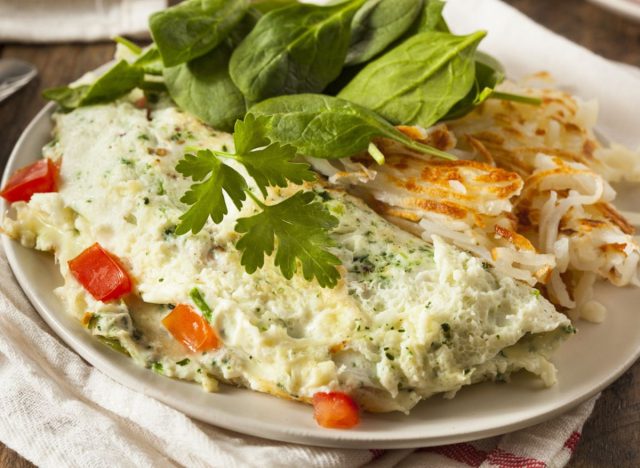Are Egg Whites Healthy? There tends to be some confusion when it comes to eggs and how healthy—or unhealthy—they might be. For instance, a 2019 study published in JAMA found that eating too many eggs was linked to an increased risk of cardiovascular disease and all-cause mortality. On the other hand, a 2022 study found in Nutrients noted that “dietary cholesterol is not a concern for cardiovascular disease risk,” meaning “foods that have been labeled as high-cholesterol sources, including eggs, may be appreciated for their various other dietary components.”
Beyond that, you may have heard that you should only eat the white part of the eggs if you want to be able to enjoy the food without experiencing potentially undesirable issues. This advice might leave you wondering, what exactly is an egg white? Lauren Manaker, MS, RDN, LDN, CLEC, CPT, tells Eat This, Not That! “An egg white is the clear liquid part of the egg that turns into a white solid when it is cooked.” She adds that it “is a nutritious part of the egg that does not include the yolk.”
Now that you can spot it, you’ll surely want to know what’s in it. Amy S. Margulies, RD, CDCES, LDN, NBC-HWC says, “Egg whites are made up of around 90% water and 10% protein,” and Catherine Gervacio, RD and nutrition writer for Living.Fit adds that “It is a high-biological protein, which means it supplies the complete essential amino acids for different body functions.” In fact, there are a range of reasons why you may want to add egg whites to your regular menu.
Benefits of eating egg whites

Whether you’re concerned about your weight or simply want to keep your body in tip-top shape, you will surely find yourself intrigued by what egg whites can offer.
“For people who are following a low-calorie diet, egg whites can be a great addition, as one serving provides under 20 calories,” Manaker says. Indeed, while there are only 17 calories in the white of a large egg, there are 55 calories in the yolk. Manaker also notes that egg whites are “a source of high-quality protein, and it contains very little fat, which is a benefit for people who are following a low-fat diet.”
Additionally, Gervacio explains that “The type of protein egg white carries is called albumin,” which “delivers different function like building and repairing body tissues and strengthening the immune system.” It also “aids in mobilizing substances via the bloodstream, especially hormones, enzymes, vitamins, and minerals.” Gervacio says this “helps keep fluid from leaking out of your blood vessels into other tissues.” Yet, “Without enough albumin, fluid can leak out of your blood and build up in your lungs, abdomen, or other parts of your body. This may potentially lead to health problems like edema (water retention), or inflammation, while low albumin levels can also be a sign of underlying health problems like kidney or liver disease.”
Don’t miss: 11 Inflammatory Foods Wreaking Havoc On Your Body
Why eat egg whites instead of whole eggs with the yolk?
“Although some people may not like the taste of the yolk, making an egg white-based dish appealing,” says Manaker, “others may require a low-fat diet, making the egg whites a fat-free protein choice that works well for this population.”
“The egg yolk contains around 5 grams of fat, including about 2 grams of saturated fat, which can add up if you’re making a multi-egg recipe like an omelet,” says Margulies. She explains, “The average large egg yolk contains 210 milligrams of cholesterol. We know dietary cholesterol is not the main issue when it comes to watching your cholesterol, but a 3-egg omelet with 630 grams of cholesterol is a lot if you have high cholesterol. Per the American Heart Association, people at risk for heart disease, who have diabetes, or who have had a heart attack should pay close attention to the amount of cholesterol in their diet.”
Healthy ways to eat egg whites

If this has you craving a tasty egg dish, then you’ll surely be interested in the best ways to cook egg whites. Fortunately, we have a few appetizing ideas. Manaker suggests an egg white egg salad, egg white burrito, egg white casserole, or an egg white omelet. Margulies also recommends the latter option, saying, “An egg white omelet works for breakfast, lunch, or dinner, as you can add fresh or frozen veggies, low-fat cheese, and top it off with salsa or hot sauce for a lean, low-calorie, well-balanced meal.”
On top of that, Margulies points out that “mixing egg whites with whole eggs for a frittata can keep your fat and calories in a healthy range for a quick, balanced meal,” while “hard-boiled eggs are an awesome, inexpensive, snack-on-the-go to bring to work, after the gym, or to keep hunger at bay in the afternoon.” She notes, “Just toss the yolks to keep your calories down.”










